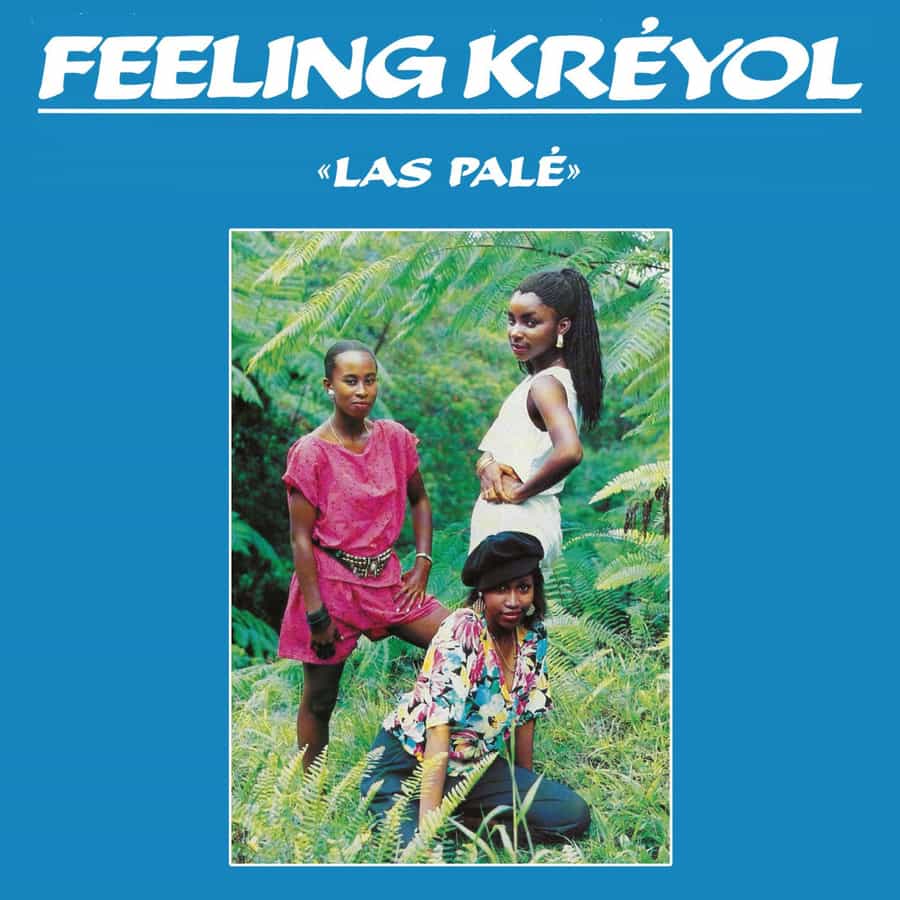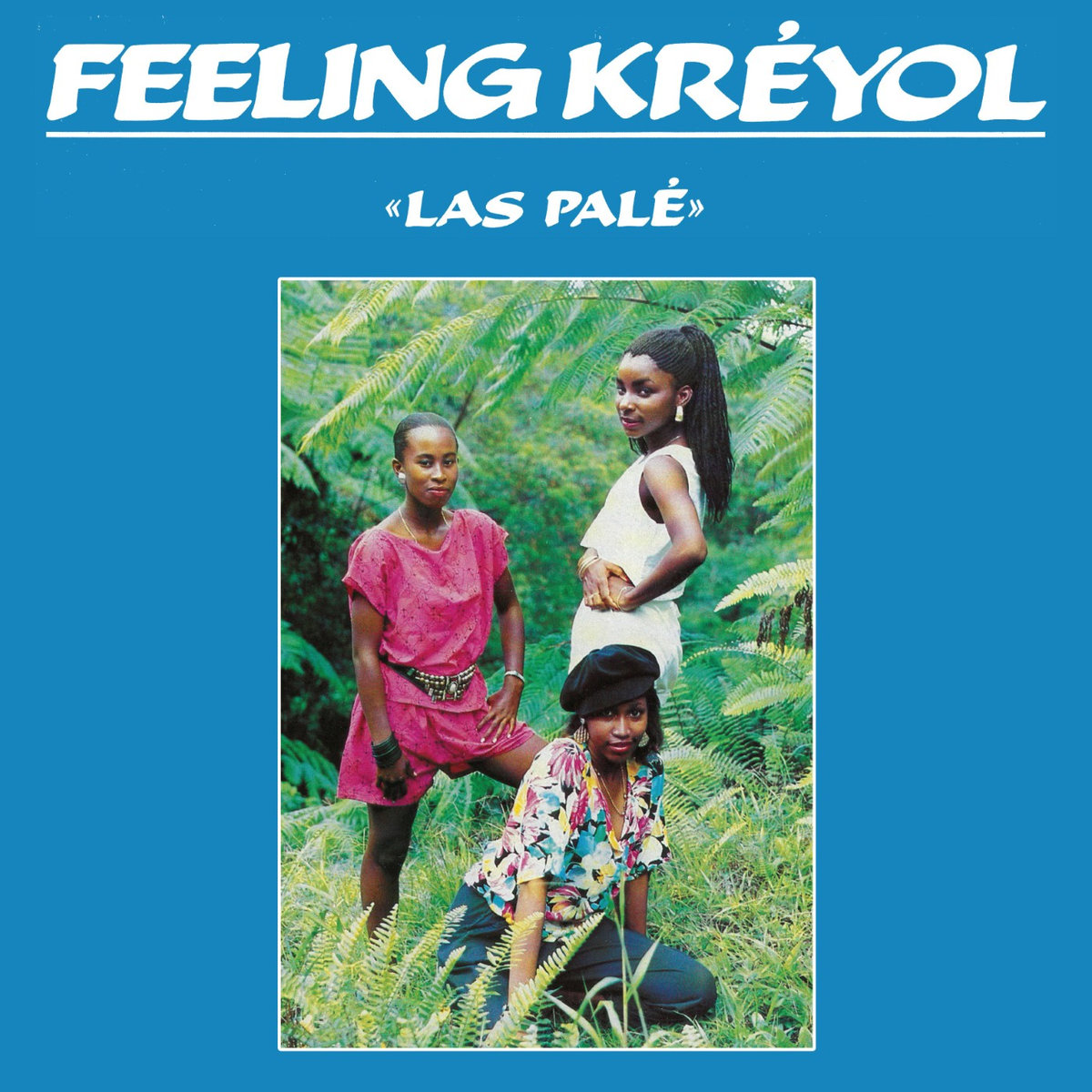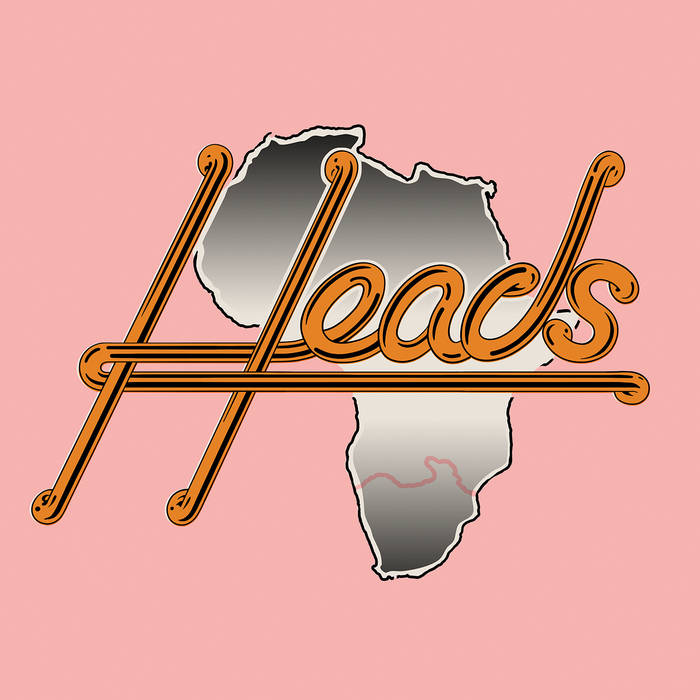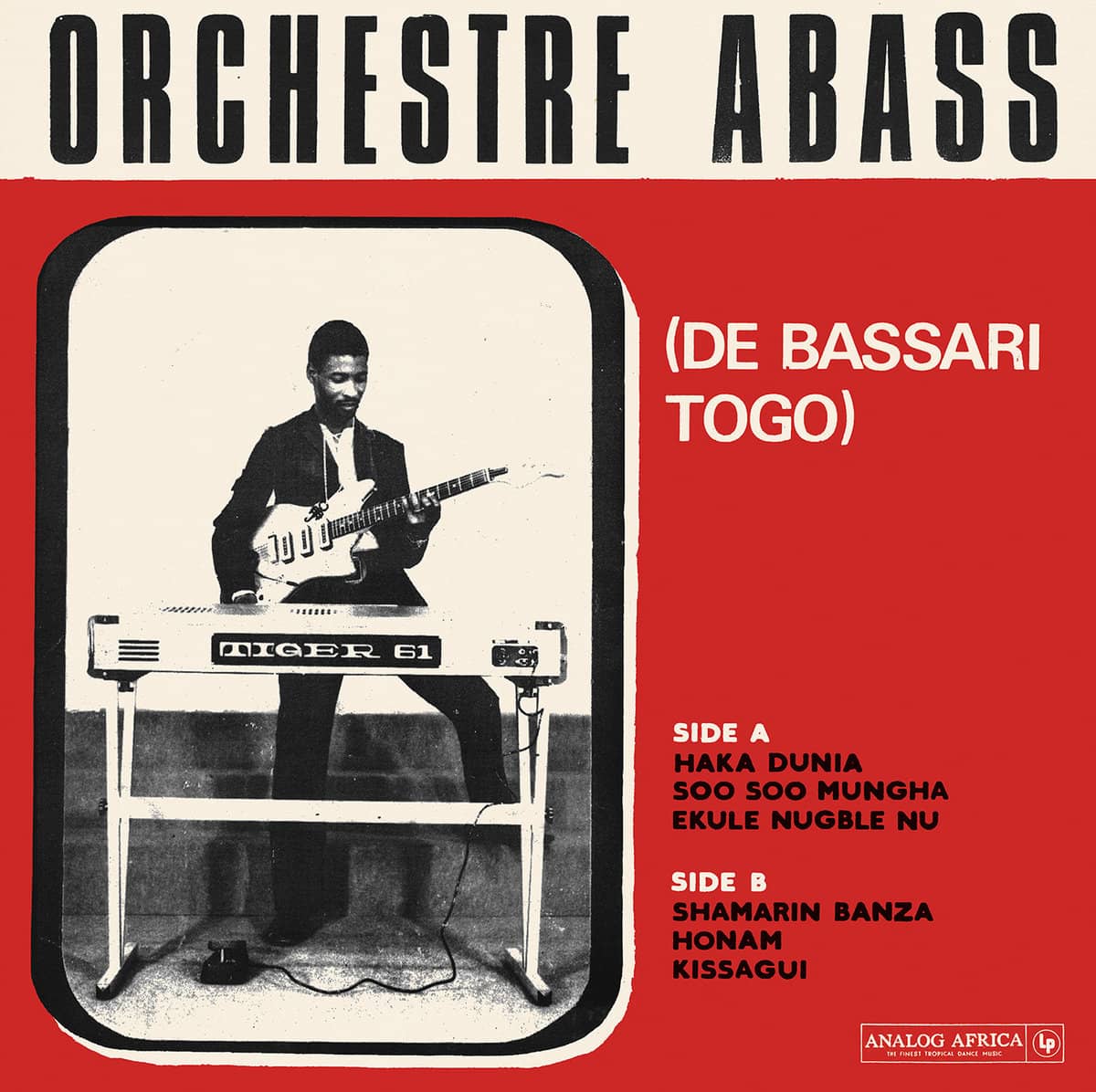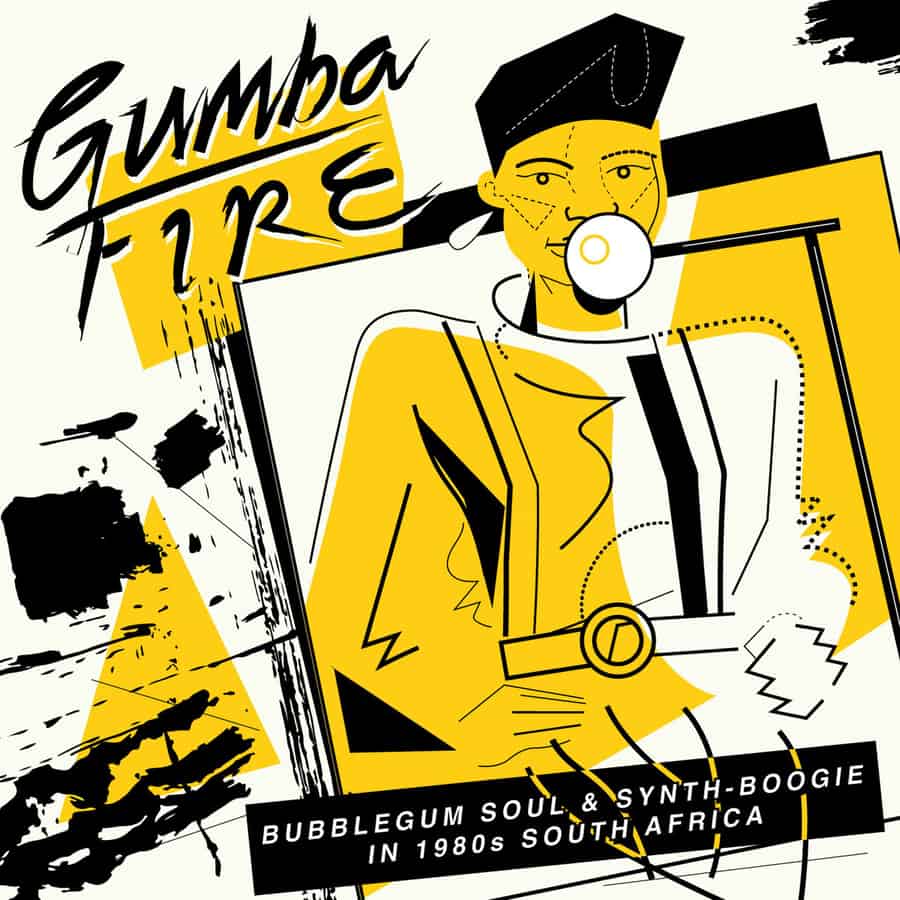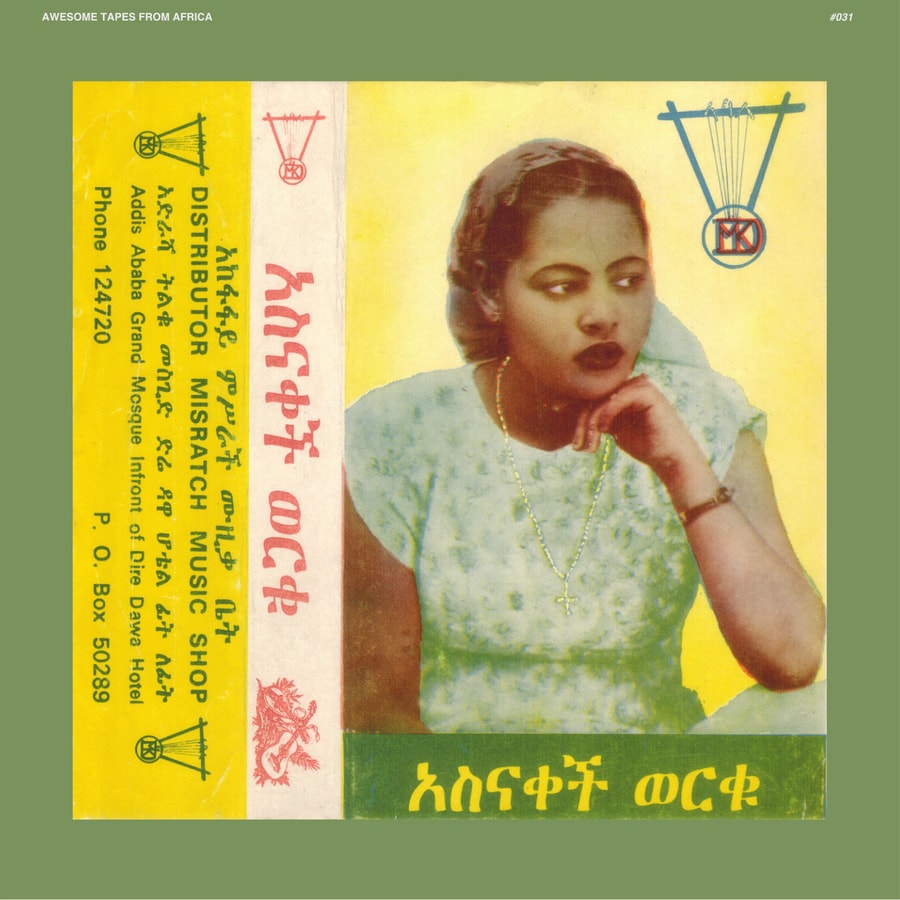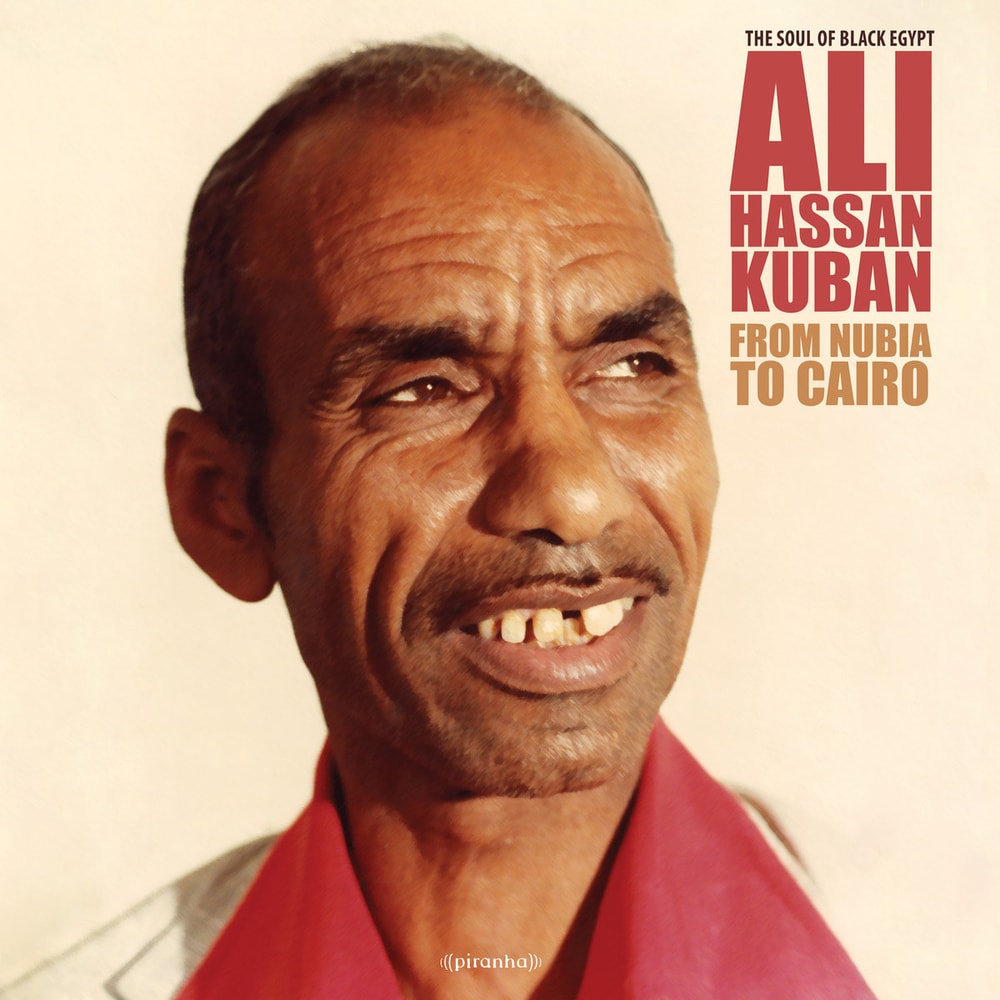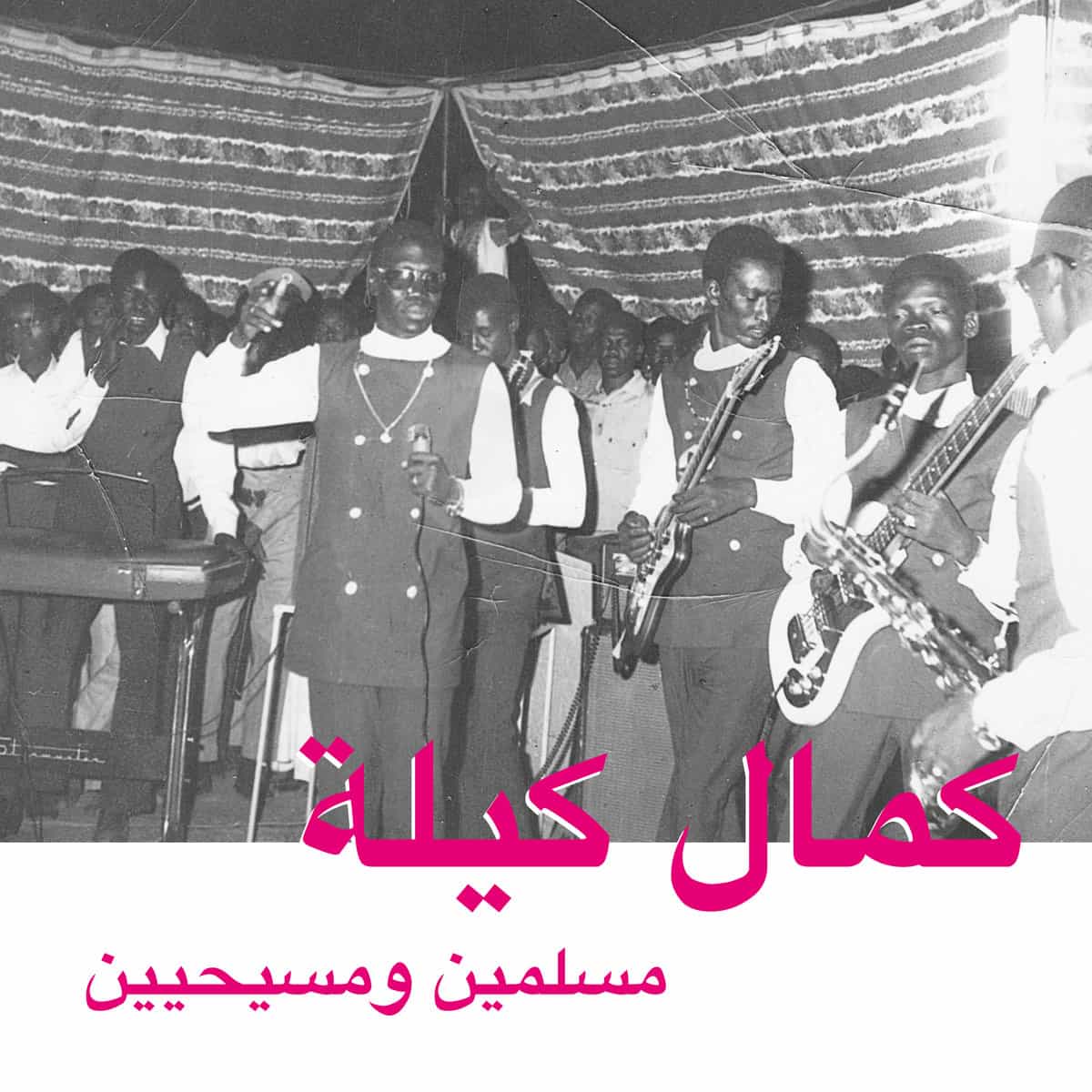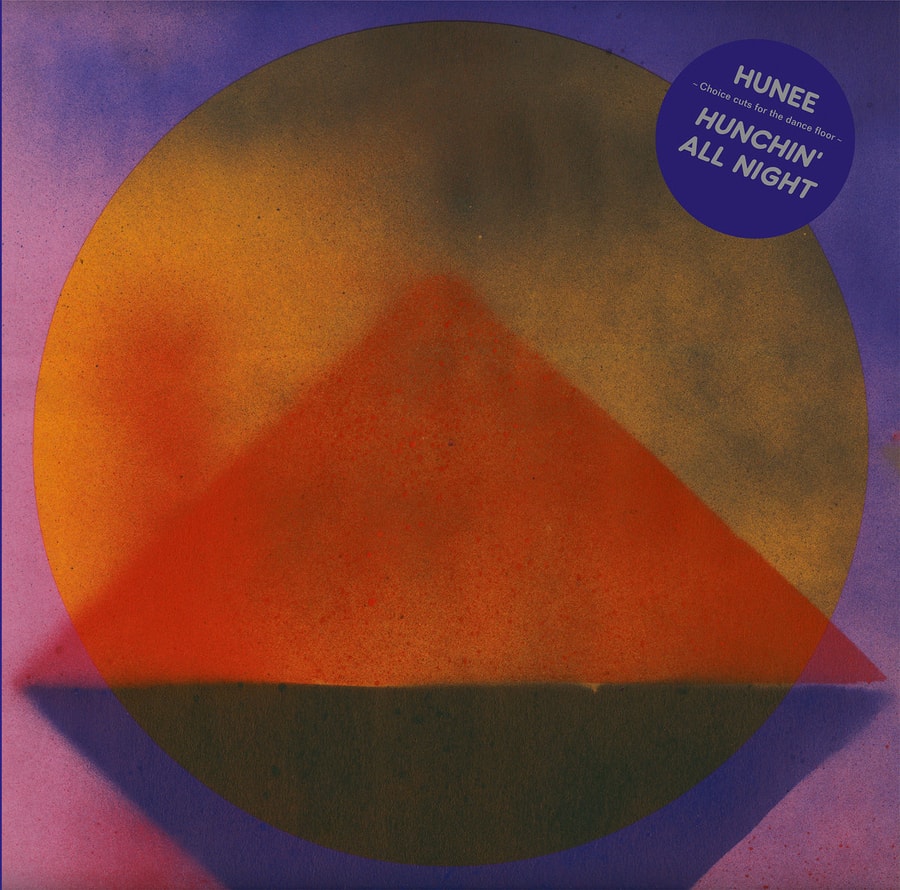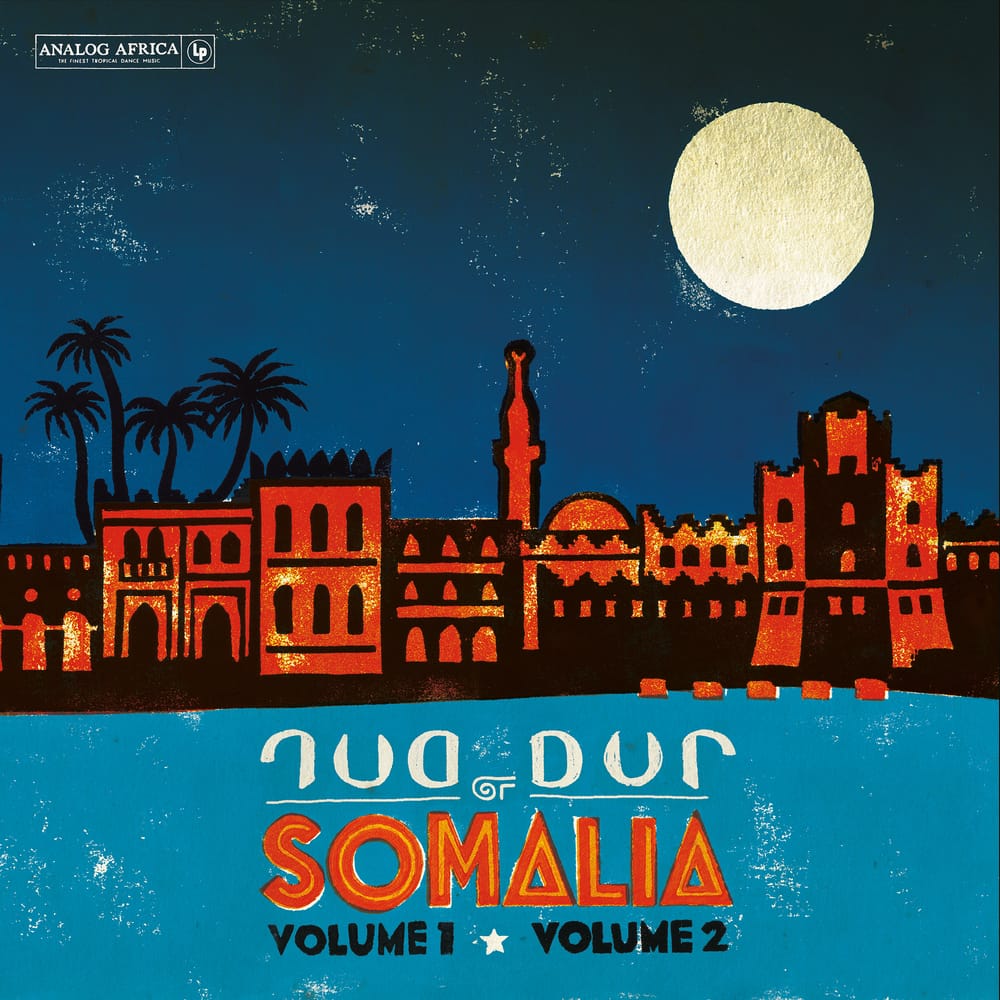The year 2018 was a great year for the reissue of musical treasures from all over the continent. Here are our 25 most loved reissue albums of 2018. This list reflects ‘favourites’ albums that PAM team have selected rather than ‘best ofs’.
In case you didn’t know, the rediscovery of the wonders of our musical past is more than burgeoning. The labels that decided to take this dedicated path have recently been flourishing thanks to the gradual extinction of the CD and the vinyl revival. Indeed, whole sections of the continent’s musical history are surfacing again from the vault. They spread across the world, far from their traditional zone of influence, often confined to a single region. Thus, East Africa – from Egypt to Ethiopia, Sudan and Somalia – is particularly well represented in this selection, for the enjoyment of those who love the multiple variations of soul and funk, mixed with rhythms and melodies directly drawn from the rich local traditions. As time relentlessly passes by, the ’80s have become a vintage decade too, and from South Africa to French districts, we rediscover the artists’ craving for synthesizers and other machines ready for any kind of experiments. Not to mention a few West African classics that have not aged one bit and are literally born again.
In this non-exhaustive tour, one can but mention the West Indies, particularly the French region, whose creativity has always proved consistent but has unfortunately not reached the ears of enough listeners until today. This year too, the songs of exile, the protest songs or those that shows the life of the communities of African ancestry on the European territories are given pride of place, thus renewing little by little the threads of a great and essential history the major labels have finally decided to offer their rightful place.
Our selection, which has produced much debate between us, is only a picture of our favorites of the year 2018. The ranking below does not refer to a real classification, as the reissues we chose range across countries and eras and, in short, tell such different stories. We may as well tell you right away, all of them should be heard again, before 2019 delivers us new ones.
Listen the playlist “The 25 best reissues of 2018” on Spotify and Deezer.
25. Feeling Kréyol
Las Palé
Strut Records
Las Palé by Feeling Kréyol is no doubt ’80s zouk at its finest. Producer Darius Denon explains: “This was 1988 and bands like Zouk Machine and Kassav were huge. I had met producer Frankie Brumier when I was performing at festivals and parties and he wanted to record a girl group, so we began scouting venues, mainly around the Grande-Terre district in the island’s capital, Pointe-à-Pitre. I ran auditions and picked out the best three voices – Fabienne, Leïla and Yolande. One was singing in a choir and none of them had met each other previously.”
Recording at a studio in Le Gosier, Denon trained them to sing the songs and spent around six weeks recording the album: “I gave them a couple of compositions that I had planned for my own solo album. I remember that we all got on really well; the sessions were fun.”
Listen: Bandcamp / Spotify / Apple Music / Deezer
24. Various Artists
Heads Records – South African Disco-Dub Edits
Soundway Records
Started and run by the late South African producer and singer Emil Zoghby, Heads label was in activity only between 1982 and 1984. During this period, the label managed to release a handful of records before folding.
This new Soundway EP features Starlight’s original track “Picnic” (a single whose B-side “Picnicing”, is featured on Gumba Fire) and edits by New York-based JKriv (Deep & Disco Recordings / Razor-N-Tape) and Frankie Francis (Sofrito Sound), whose magic touch on last year’s edit of Steve Monite “Only You” was one of Soundway’s most popular releases of 2017.
Listen: Bandcamp / Spotify / Apple Music
23. Orchestre Abass
De Bassari Togo
Analog Africa
In 1972, Orchestre Abass released two incredible singles on Polydor. These records – featuring Samarin Banza, Haka Dunia and other afrofunk masterpieces – were powerful enough to knock any music head out, but it wasn’t until the discovery of some unreleased material by the band that the seeds for this project were planted.
Analog Africa’s boss explains: “It all happened in 2008 in Ghana. I was going through some tapes that had previously been the property of PolyGram one of the major record companies based in West Africa. In the late ’80s political instability and curfews had paralysed the music industry, and forcef Polygram to close their Ghanaian subsidiaries and leave all of their recordings behind. These recordings had been packed in boxes and left forgotten in an Accra warehouse for three decades until I came along. To my surprise all of the tapes looked unharmed and I was particularly relieved to hear that the Orchestre Abass tape was in an excellent state of condition. I began fiddling around with the idea of releasing an album of the band and that plan got an additional boost with le ‘coup de grace’ which had landed in the form of an ultra rare tune called Honam discovered in Sotoboua, a small northern Togolese town in the middle of nowhere. That find completed this selection.”
Listen: Bandcamp / Spotify / Apple Music / Deezer
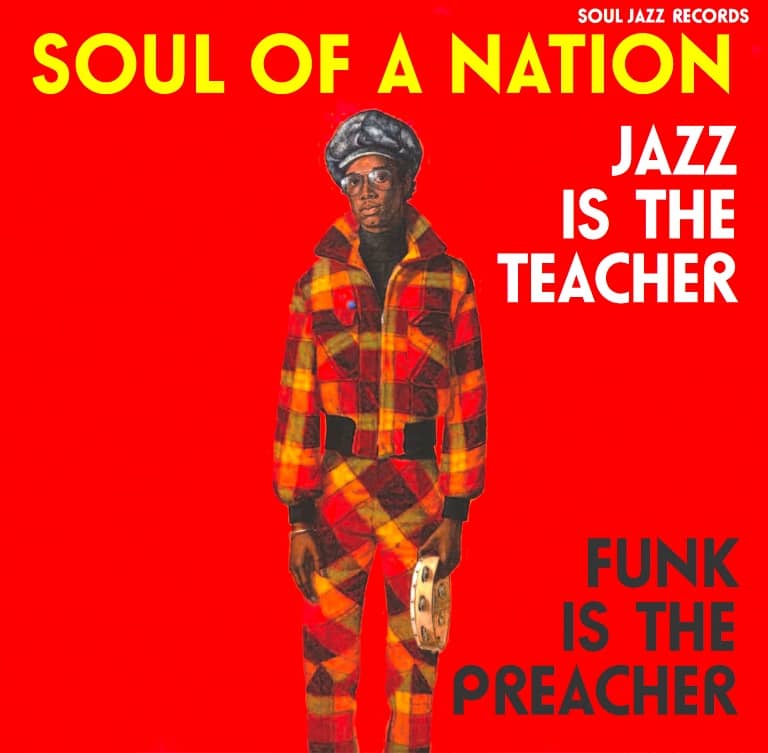
22. Various Artists
Soul of a Nation 2: Jazz is the Teacher, Funk is the Preacher: Afro-Centric Jazz, Street Funk and the Roots of Rap in the Black Power Era 1969-75
Soul Jazz Records
Soul Jazz Records’ new release Soul of A Nation: Jazz is the Teacher, Funk is the Preacher is a powerful new collection of radical jazz, street funk and proto-rap made in the era of Black Power (1969-75).
This album features a number of important and ground-breaking African-American artists – The Art Ensemble of Chicago, Don Cherry, Funkadelic, Gil Scott-Heron and more – alongside a host of lesser-known artists all of whom in the early 1970s were exploring new Afrocentric poly-rhythmical styles of music – radical jazz, street funk and proto-rap – while at the same time exploring the Black Power and civil-rights inspired notions of self-definition, self-respect and self-empowerment in their own lives.
Listen: Apple Music / Spotify
21. Various Artists
Gumba Fire: Bubblegum Soul & Synth-Boogie in 1980s South Africa
Soundway Records
Bubblegum music was born in 1980s Black South Africa, from the ashes of disco. It was a “usually stripped-down and lo-fi with a predominance of synths, keyboards and drum-machines and overlaid with the kind of deeply soulful trademark vocals and harmonies that South African music is famous for,” shares Soundway.
Gumba Fire: Bubblegum Soul & Synth Boogie In 1980s South Africa highlights the country’s musical movements between “the ’70s where American-influenced jazz, funk and soul mixed with local Mbaqanga sounds; and the ’90s when kwaito and house music ruled the dancefloors of urban South Africa.” The name gumba fire means “a hot party”, and comes from the phrase “gumba gumba”, a term for the old spacegram radios that broadcast music into South Africa’s townships and villages.
Listen: Bandcamp / Spotify / Apple Music
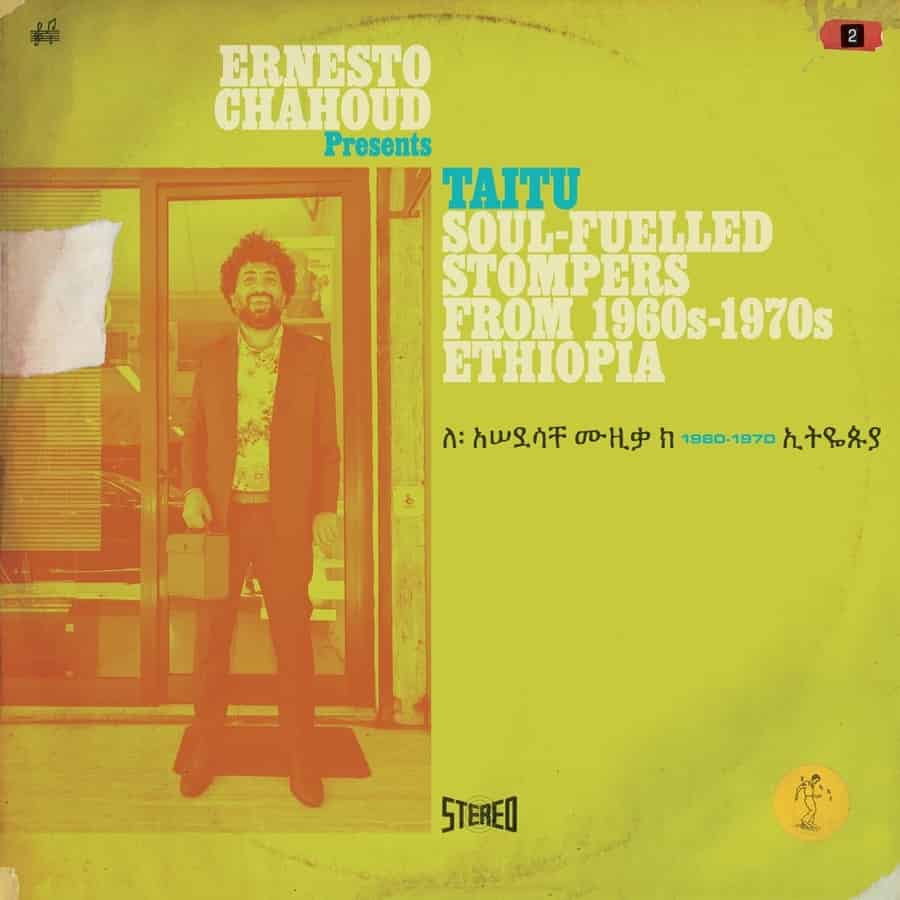
20. Ernesto Chahoud
Taitu: Soul-fuelled Stompers from 1970s Ethiopia
BBE Records
Ernesto Chahoud’s Taitu represents the sound of the dancefloors of 1970s Addis Ababa. Among the musical gems featured are 7”s by some of the heavyweights of the scene including the godfather of ethio-jazz Mulatu Astatke and Alemayehu Eshete, the vocalist dubbed “The Ethiopian Elvis”, alongside tracks by more obscure artists such as Merawi Yohannis and Birkineh Wurga. Listen to the excerpts below.
“For Taitu, Chahoud has selected 24 of his essential Ethio-Soul 7”s, that never leave his DJ box, and together they capture this opportune moment in Ethiopian music history that saw bands experiment with an armful of influences: gliding through R&B, rock & roll, jazz, funk, soul and boogaloo. What came out was a distinctly Ethiopian interpretation: pentatonic scales, horn-driven melodies and soul-shattering vocals sung in Amharic.”
Listen: Bandcamp / Spotify / Apple Music / Deezer

19. Various Artists
African Scream Contest 2
Analog Africa
Ten years ago, Analog Africa released the first African Scream Contest, “a record that took you into its own space with the same electrifying sureness as any favourite blues or soul or funk or punk sampler you might care to mention.”
Beninese musician Lokonon André – who was trained by the Russian secret services –tracked down the artists himself for this compilation. His goal was to “highlight the tension between encroaching authoritarian politics and fearless expressions of personal creative freedom which is the back-story of so much great African music of the ’60s and ’70s.”
Listen: Bandcamp / Spotify / Apple Music
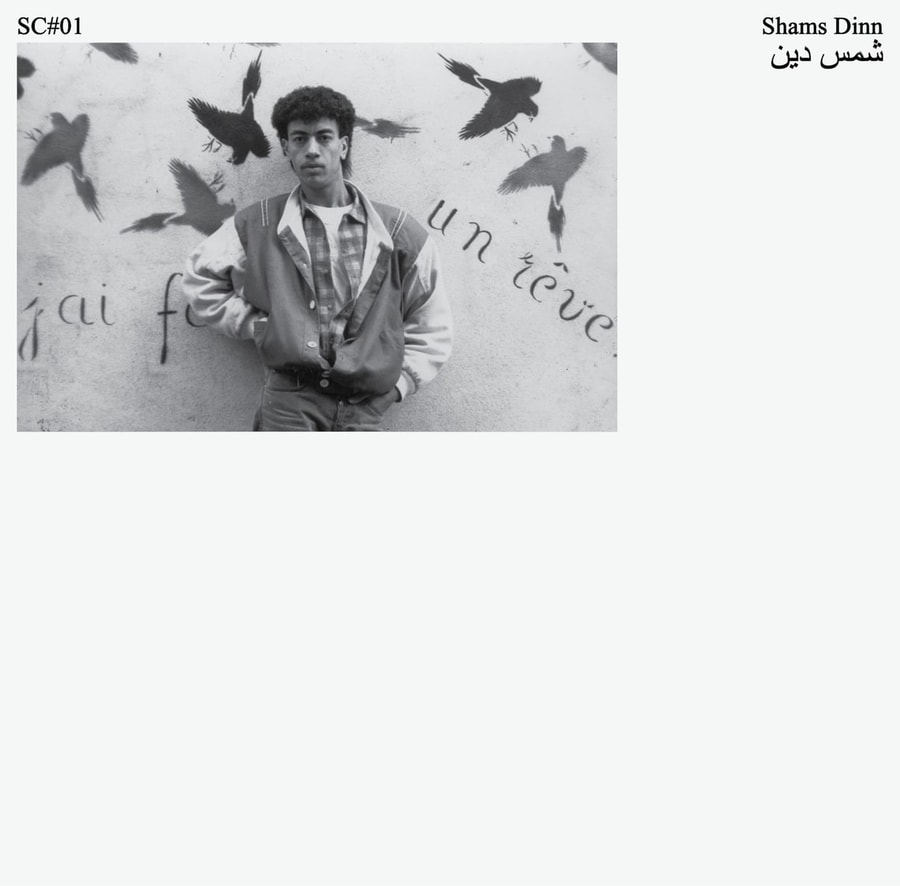
18. Shams Dinn
شمس دين
Smiling C
For their first-ever reissue, Smiling C connected with the Arabic rapper Shams Dinn to release a compilation of his best songs, including the hit “Hedi Bled Noum”. The compilation covers his entire career featuring songs made between 1985-1990 – most of them went unreleased at the time. One of the few Moroccan rappers to ever be recorded on vinyl back in the ’80s, Shams Dinn was a pioneer of Arabic flow. He started his career because he wanted to be a positive model for the Arabic immigrants living in France. He earned his status by participating in freestyle competitions, and performing in small clubs around Europe.
His career came to a turning point when he was asked by a major label to record a full LP. Unfortunately, the label decided they didn’t want to promote Arabic music – largely because of the Gulf War – and asked Shams to translate the Arabic to French. Shams Dinn wouldn’t stand for that, and he was dropped from the label. The following years he started working at a school, teaching kids how to rap and express themselves through words.
Listen: Bandcamp
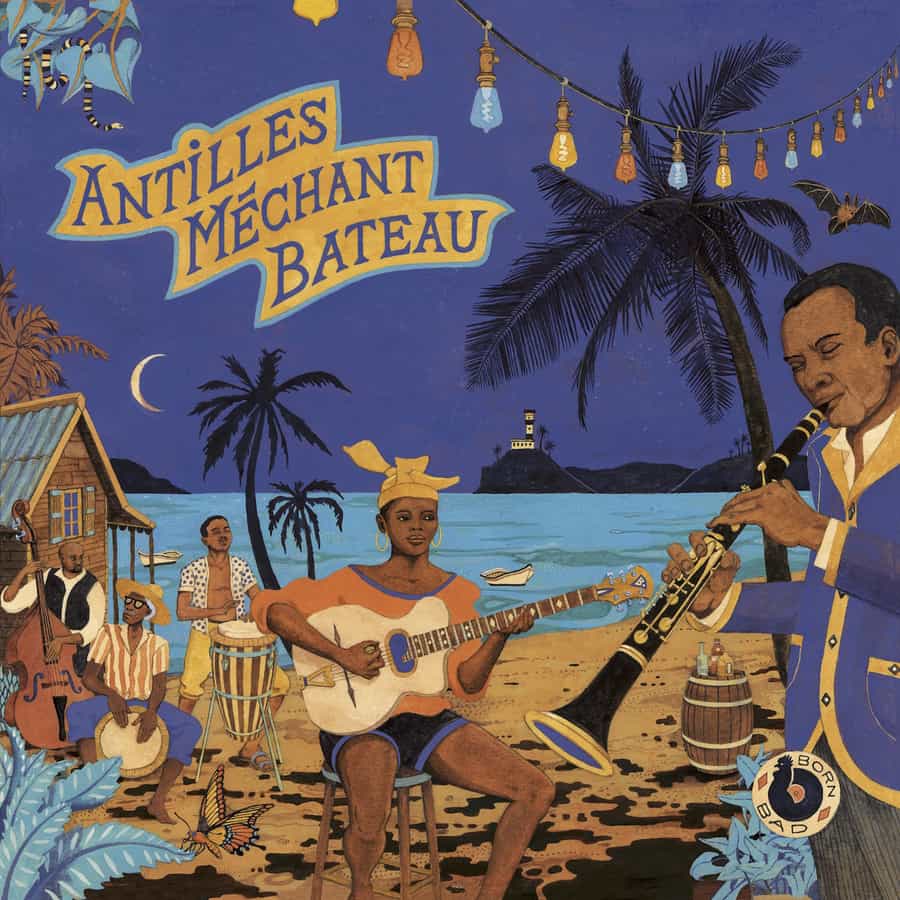
17. Various Artists
Antilles Méchant Bateau
Born Bad Records
“Antilles Méchant Bateau” is a low-tempo number with a bolero feel, indeed a pure blues, with a great saxophone solo. What else would you expect to set the tone for this selection, in which biguine regains its original colors, in the darkness of the gwo ka drums? This 45rpm by André Mahy, released under the Aux Ondes sublabel, was recorded in the 1960s at Célini’s, one of Guadeloupe’s two main houses. Through its drum rolls and harrowing chant, it recalled how, long before the mid-1960s, the Antilles’ history was being written in an ocean of teardrops – namely the Black Atlantic, as Martinician philosopher and poet Edouard Glissant rightly put it in the poetry book L’Archipel des Grands Chaos.
There is no doubt about it: blues and ka fought the same battle – centuries of oppression and negation, before finding the path to a possible redemption. Between them, the same language – the language of the Creole spirits, flooded in the great ocean. This is what this selection is about, and its good, inborn sense of humor shouldn’t hide the implicit commentaries. There, jazz instills an emancipating energy from established formats, giving these songs a musicality that rhymes with spirituality. From infernal cadences borrowing from the “latin” rhythms of neighboring islands, to biguines with percussion-spiced tempos, to more laid-back – yet dark – ballads, this compilation takes us back to the early hours of a movement of rebirth, synonymous with recognition. A rejuvenation in which all the musics from the Black Atlantic diaspora naturally intertwine. Like a wave of sounds, of sense and blood, reminding us that an original culture emerged from the holds of these “wicked boats” – “méchants bateaux” –, the trace of which remains starkly persistent in 2018.
Listen: Bandcamp / Spotify / Apple Music
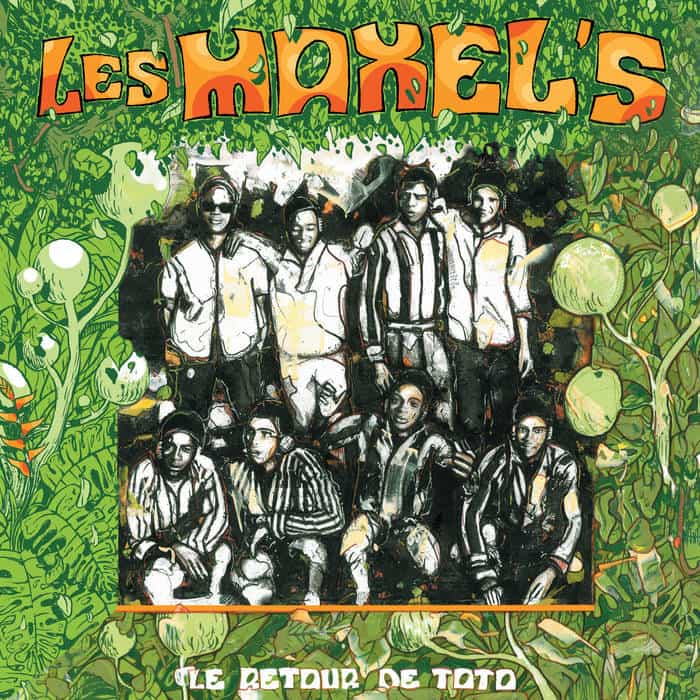
16. Les Maxel’s
Le Retour de Toto
Atangana Records
Originally out in 1976, « Le Retour de Toto » on Disques Debs International is a brilliant dancefloor killer, magnifying the crossworld between zouk and latino music, biguine and calypso. You can hear from the promeminent hi-hat all the energy of the dance moves you could improvise on that kind of joint. With a lot of break, wonderful horns and backing vocals, « Le Retour de Toto » will entertain any summer dancefloor and airwaves for some time…
Deni Shain says : “When we discovered this gem with my friend Likkle Ben, over a night of digging, it’s mainly the keyboard break that drove us nuts ! We were already hearing the edit that we’d make for our gigs… It didn’t take long for me to contact the family of Henry Debs, introducing Atangana’s project. They loved it, and at that time I went to studio with my friend Papa Stomp to start remixing it… I love how we added step by step the addparts, giving respect to the original tape…”
Listen: Bandcamp / Spotify / Apple Music / Deezer
15. Asnakech Worku
Asnakech
Awesome Tapes From Africa
Awesome Tapes From Africa reissued Asnakech, a famous album from musician, dancer and actress Asnakech Worku. This recording is a nearly-forgotten artifact of the remarkable icon’s singular legacy, remastered and available outside Ethiopia for the first time.
From her beginnings as Ethiopia’s first theater actress in 1952, to her acclaimed film appearances, and to her days as a club owner-turned-master musician, Asnakech’s inimitable confidence and charm made her a household name. She earned endless accolades across the artistic spectrum.
Listen: Bandcamp / Spotify / Apple Music / Deezer
14. Ali Hassan Kuban
From Nubia to Cairo
Piranha Records
From a self-taught musician exploring his Nubian people’s musical roots to a professional, successfully leading his various bands into new, vibrant, international pop territory – Ali Hassan Kuban became an international star when his music finally went global in the 1980s.
When exactly were Ali Hassan Kuban’s legendary recordings made – released internationally by Piranha only in 1988 –, nobody knows any more. What we do know, however, is that the recordings had taken place at Delta Sound S.A. in Cairo – with the orchestra’s entire line-up circled around the only working microphone at hand. The tracks had been travelling in the Arab world on two audio-cassettes afterwards and accompanied his rise from a local superstar to a musical innovator of new, vibrant, international pop.
From Nubia to Cairo is the first milestone in urban Nubian pop. The record will be available in glorious audiophile format – remastered from analogue tapes with listening standards refined to the contemporary levels. The first batch of Ali’s long-legendary Nubian originals, seductively praised in touching lyrics his native Nubia and Egypt, their people, in particular, their women, and life. Life in general.
Listen: Bandcamp / Spotify / Apple Music / Deezer
13. Kamal Keila
Muslims And Christians
Habibi Funk
Berlin based label Habibi Funk is launching a new series covering the Sudanese jazz scene. The first record is Kamal Keila’s Muslims And Christians. When label’s boss Jannis Stürtz started to prepare his trip and learn about the musical scene of the nation’s capital in the 1970s, Kamal Keila was a name that came up here and there, coined “Sudan’s James Brown” or “Fela Kuti of Sudan”.
According to the label, “some of the songs were already written in the 1970s and have been part of Keila’s sets ever since, with only small changes for contemporary references in the lyrics and musically sometimes adopting to ‘new’ sounds here and there.”
They add, “Both sessions stand as a testament to how he stuck to a sound aesthetic from decades ago, while incorporating current events into his lyrics.”
Listen: Bandcamp / Spotify / Apple Music / Deezer
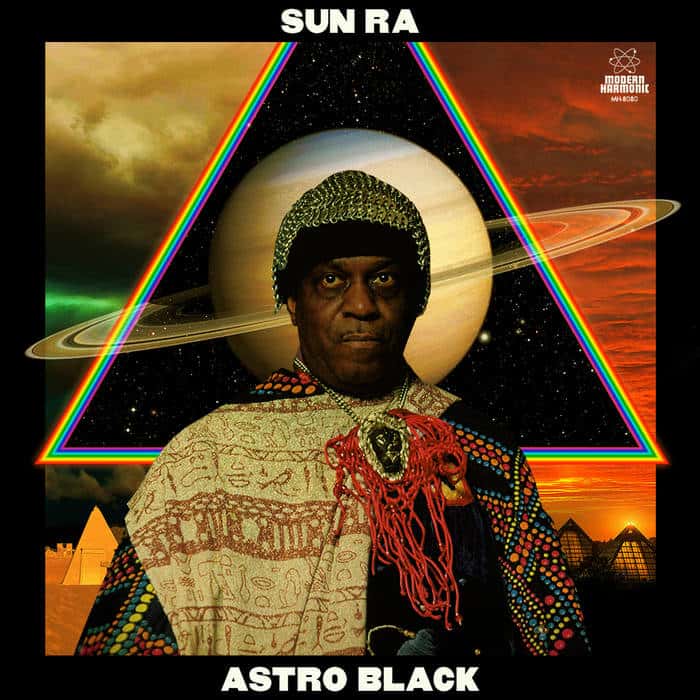
12. Sun Ra & His Arkestra
Astro Black
After years of self-released albums on his own Saturn label, Sun Ra signed with ABC’s Impulse jazz imprint in 1972. A reissue series of his earlier hard-to-find Saturn LPs was undertaken, along with a few new projects. The first premiere, Astro Black, was recorded and released in 1973 in the now-obsolete quadraphonic format (though it was playable on stereo phonographs). The undertaking signaled a noble campaign on the part of Impulse producer Ed Michel to mainstream Sun Ra and broaden his audience, without any sacrifice of his artistic integrity.
Astro Black was a come back to an almost accessible work, away (yet not completely) from the anti-jazz experimentations of the late 1960s, and towards synthesizers-driven space jams. The Arkestra’s horn skronk was still prominent, but on side one of Astro Black it was largely anchored by the propulsive rhythm section of returning bassist Ronnie Boykins and drummer Tommy Hunter (along with a battalion of African percussions). With Sun Ra perched behind his Minimoog, this is very much a 1970s album. But as any listener will attest, it’s also very much a Sun Ra album.
Listen: Bandcamp / Spotify / Apple Music / Deezer
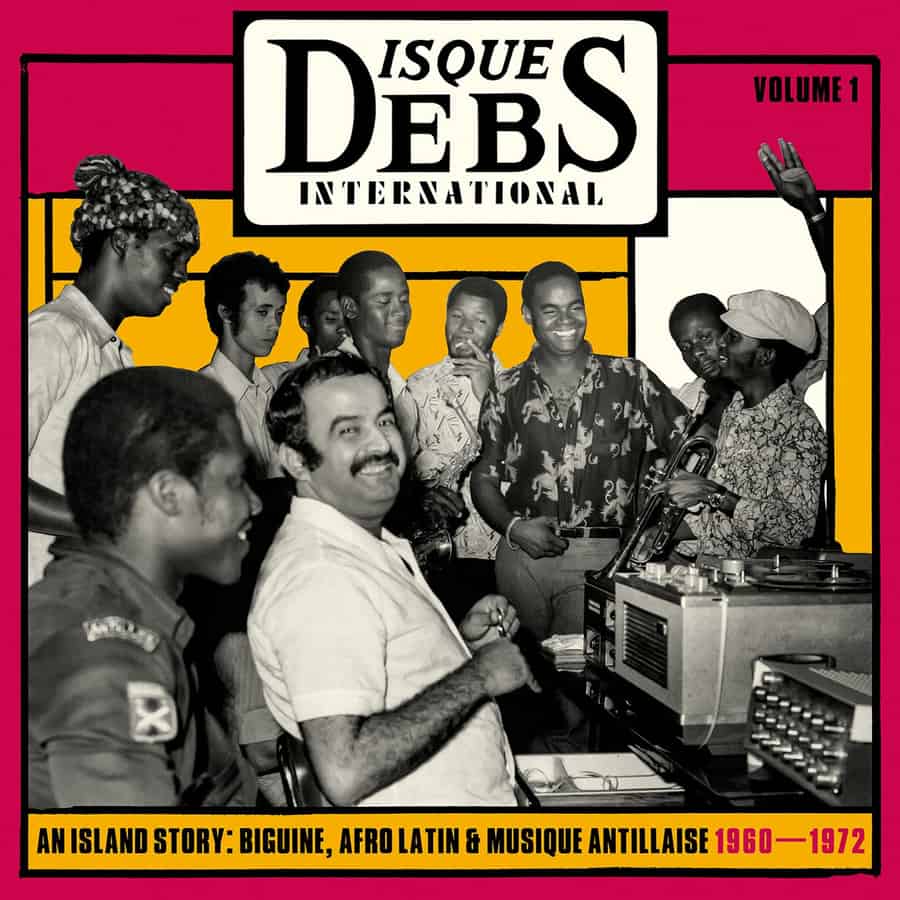
11. Various Artists
Disques Debs International, Vol.1: An Island Story: Biguine, Afro Latin & Musique Antillaise 1960-1972
Strut
Created by the late Henri Debs during the late ’50s, Disques Debs was a label and a studio that released over 300 7” singles and 200 LPs, covering styles varying from early biguine and bolero to zouk and reggae. It played a pivotal role in bringing the creole music of Guadeloupe and Martinique to a wider international audience.
An Island Story: Biguine, Afro Latin & Musique Antillaise 1960-1972 is the first volume of this series. It’s focused on the first decade of the label’s existence and takes in big band orchestras, home-grown stars, touring bands and a new generation that would emerge at the end of the ’60s. Early releases were recorded in the back of Henri’s shop in Pointe-à-Pitre, from his own sextet playing percussive biguines to young saxophonist Edouard Benoit, leader of Les Maxels and regular arranger for Debs bands. Other artists ranged from big bands like Orchestre Esperanza and Orchestre Caribbean Jazz to poet and radio personality Casimir “Caso” Létang and local traditional gwo ka artist Sydney Leremon. Debs also capitalised on recording foreign touring artists visiting Guadeloupe during the early ’60s including Haitian trumpeter Raymond Cicault and Trinidadian bandleader Cyril Diaz.
Listen: Bandcamp / Spotify / Apple Music
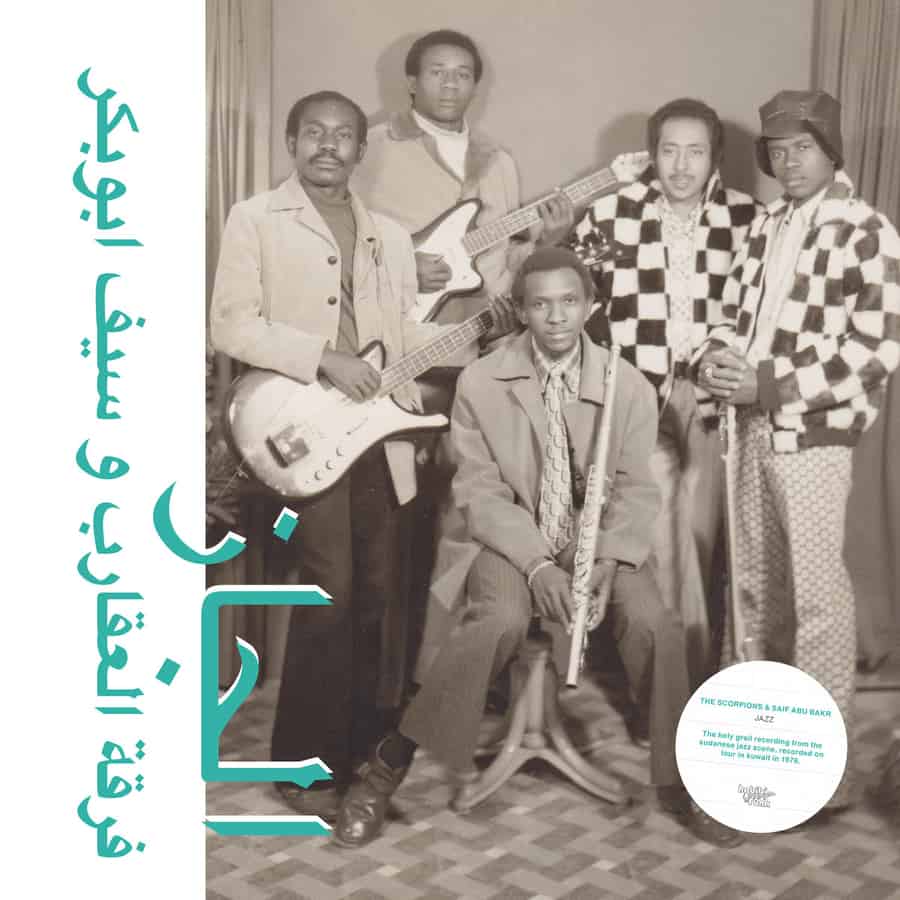
10. The Scorpions & Saif Abu Bakr
Jazz, Jazz, Jazz
Habibi Funk
Released in 1980, Scorpions & Saif Abu Bakr’s Jazz, Jazz, Jazz was offered a new release in November thanks to Habibi Funk. Jazz Jazz Jazz is described by Habibi Funk founder Jannis Stuertz as ranging from “instrumental tracks awaking memories of 1970s crime thriller soundtracks to more Sudanese-rooted tracks, a lot of them modernised versions of traditional tribal rhythms and even an excursion into soukouss.”
Jazz, Jazz, Jazz includes full liner notes by Stuertz, as well as the band’s history and an interview with the group.
Listen: Bandcamp / Spotify / Apple Music / Deezer
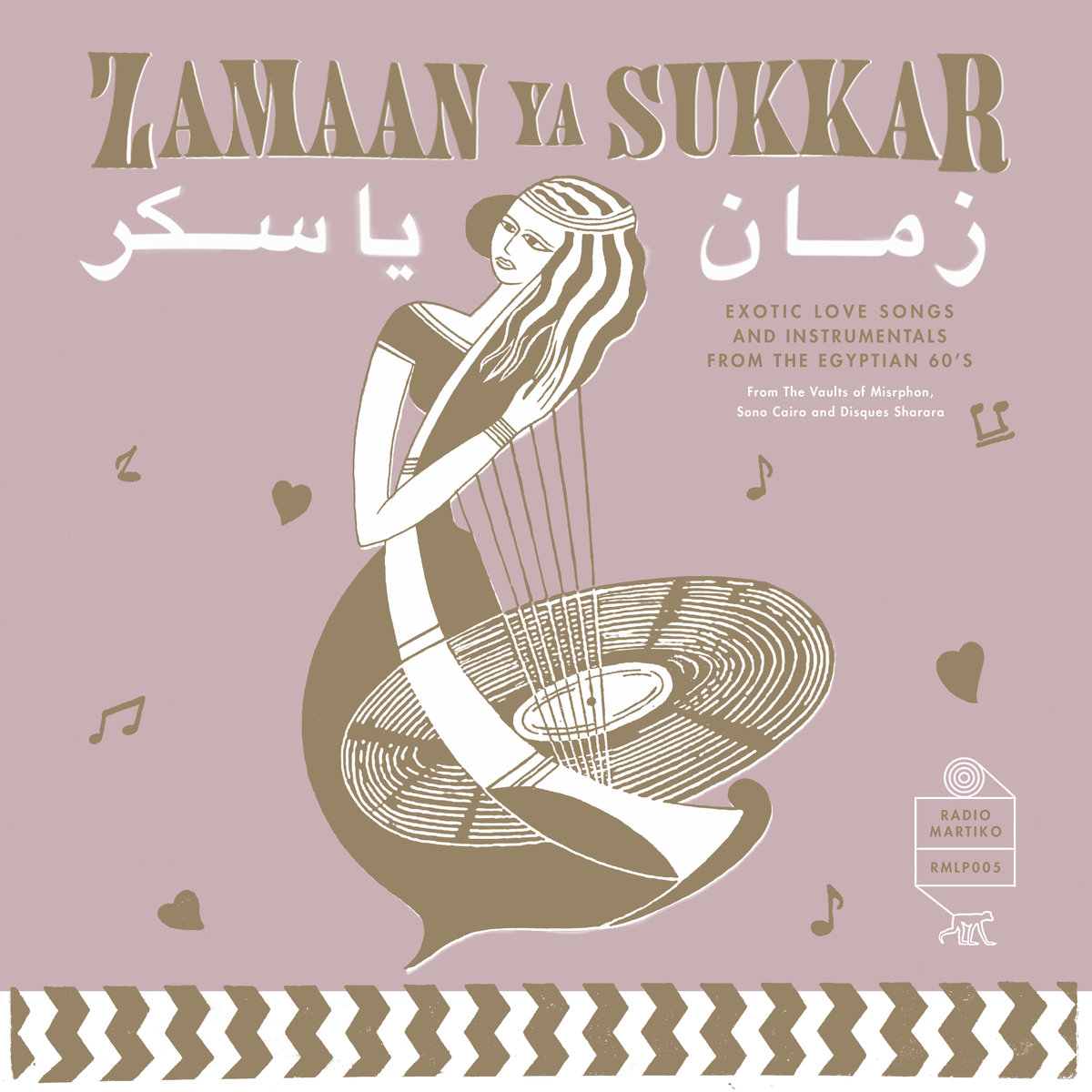
9. Zamaan Ya Sukkar
Exotic Love Songs and Instrumentals from the Egyptian 60’s
Radio Markito
Zamaan Ya Sukkar is a rich musical portrait from the time when Cairo was the vibrant cultural heart of the Middle East and the grandeur of the leading orchestras was incomparable. Unearthed latin and jazz-tinged tracks will let your mind drift off to the glamorous nightlife of ’60s Cairo. Meet some forgotten souls of the Egyptian music scene and cinema world. Sensual voices and Bollywood-like orchestra sounds inflame the senses of the body with an intangible exotic twist!
All music was remastered from original 45rpms produced by Sono Cairo. Features Salim El Baroudi, Sayed Salamah, Abd Al Fattah Mansi, Soad Mohamed, Al Thourathy Al Mareh, Taha Al-Ugayl, Mohamed Fawzy, and Magda Ali.
Listen: Bandcamp / Spotify / Apple Music
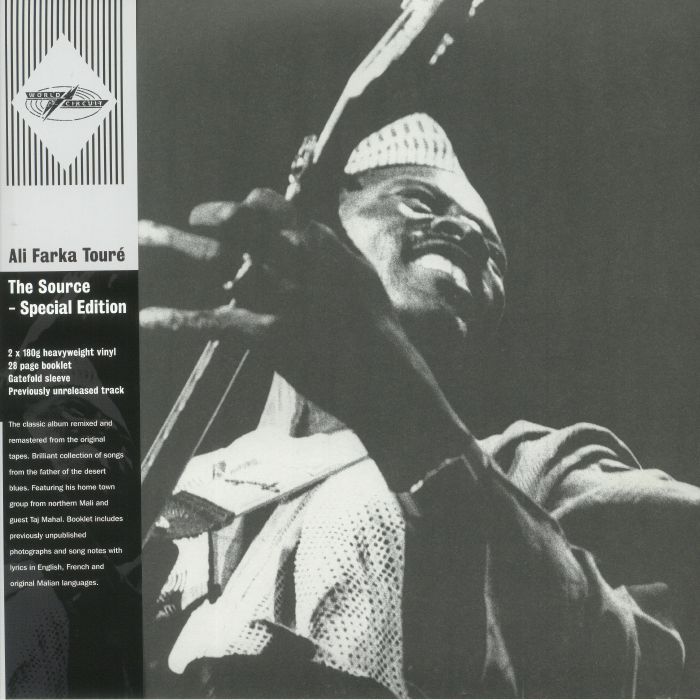
8. Ali Farka Touré
The Source
World Circuit
Ali Farka Touré was a true original. An exceptional musician, he transposed the traditional music of his native north Mali and single-handedly brought the style known as desert blues to an international audience.
This album, The Source, is a wonderful collection of songs from his repertoire and takes the listener through an absolute garden of musical fragrances, all nurtured by the deep, rich soil of the history of the African peoples. All of this is then filtered through the genius of one of the world’s premiere musicians.
Listen: Bandcamp / Spotify / Apple Music / Deezer
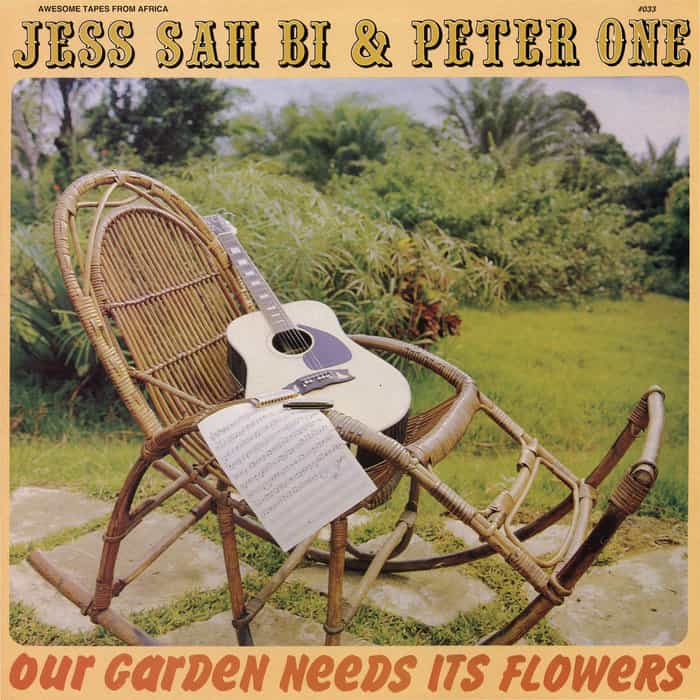
7. Jess Sah Bi & Peter One
Our Garden Needs Its Flowers
Awesome Tapes From Africa
In the 1980s, Abidjan’s Jess Sah Bi & Peter One became one of the most popular musical acts in not just the Ivory Coast (Côte d’Ivoire), but also broader West Africa, eventually performing with a full band to stadium-sized audiences at home and throughout Benin, Burkina Faso and Togo.
Country music and folk-rock weren’t very popular with the general public. But interest was bubbling up within the growing student population, who connected with the protest sentiments expressed by many English and American artists of the era and loved the sound as well. “It’s very nice music, with very nice harmonies, and it’s different from what you hear every day,” Peter says. “The language was a big barrier though. You had to learn English to understand the songs, and the students were the ones learning English.” Having access to education along with their awareness of social and political inequality and injustice made students the perfect audience for folk music in Ivory Coast.
After Our Garden Needs Its Flowers’s release, Jess and Peter’s profile lifted rapidly, leading to those stadium performances across West Africa. Jess and Peter’s run lasted until the early 1990s, capped off with the BBC using their song “African Chant” as theme music for the day Nelson Mandela was released from prison.
Listen: Bandcamp / Spotify / Apple Music / Deezer
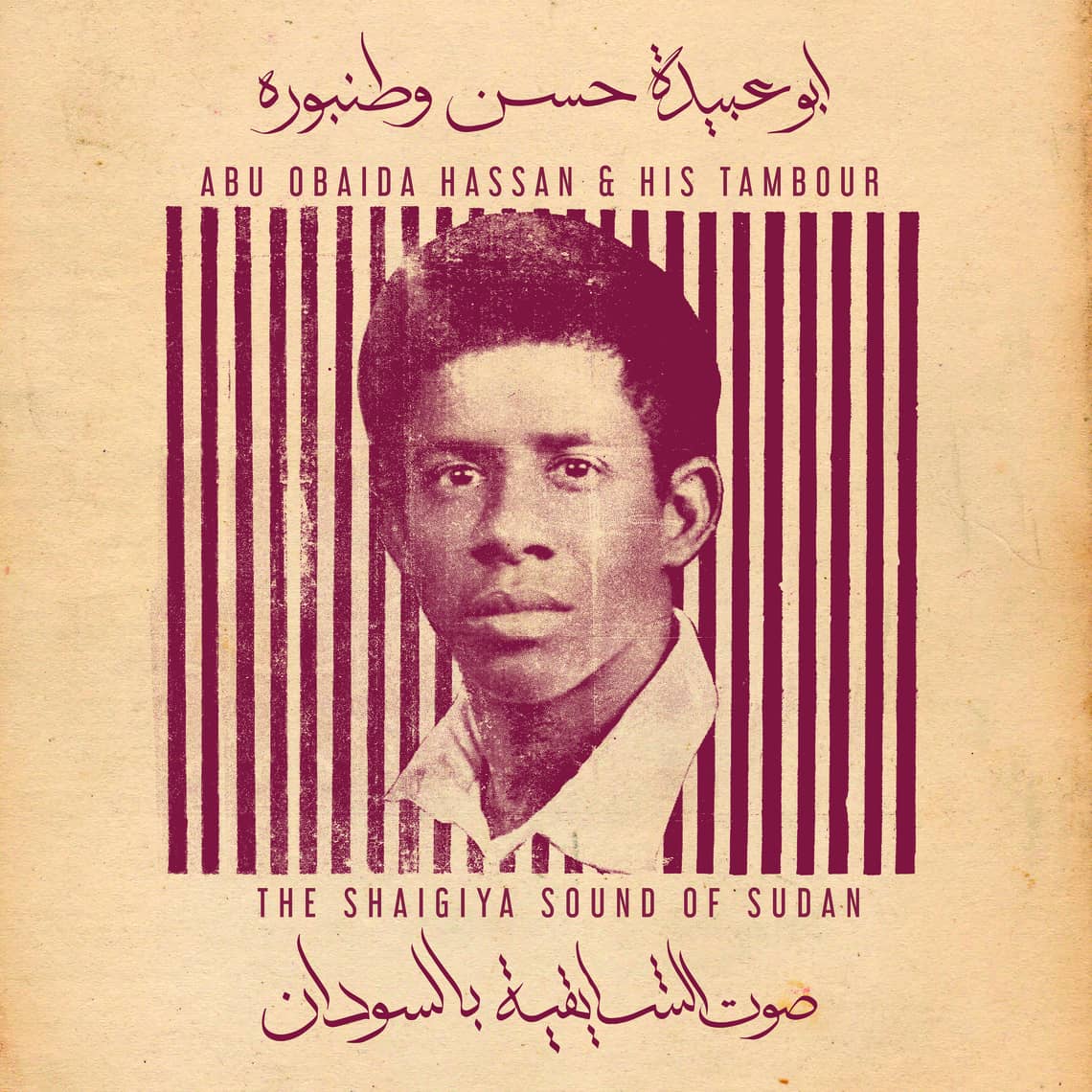
6. Abu Obaida Hassan & His Tambour
The Shaigiya Sound of Sudan
Ostinato Records
Brought to you by the Grammy-nominated team behind last year’s Sweet As Broken Dates, the first global release of Shaigiya music is just the beginning of Ostinato’s immersion into Sudan.
Abu Obaida Hassan and the wonders of his five-string tambour remained largely a mystery. In the early 2000s, a prominent Sudanese newspaper declared him dead. Internet forums confirmed his passing. Many in Khartoum, Sudan’s capital, said he had indeed deceased. But rumors that he was still alive persisted. What was always certain is Abu Obaida Hassan’s mercurial talent. His command of a modified tambour, backed by a chorus and two drummers, unleashed swirling melodies alongside complex Nubian rhythms and hypnotic Sudanese call and response. His bands lineup constantly changed, but he remained at the helm, playing for sold out shows in cities across the country and capturing the dancefloors and youth of 1970s and ’80s Sudan.
Abu Obaida Hassan, his music and the musical traditions of the Shaigiya remain alive and kicking. A culmination of a seven-year journey — from first hearing Abu Obaida’s distinct sound, found only in Sudan, to finding the man — has produced the first global release of Shaigiya music and is the first chapter of Ostinato’s immersion into Sudan, with a full compilation of the lavish musical history of one the most diverse countries in Africa due later this year.
Listen: Bandcamp / Spotify / Apple Music / Deezer

5. Rocé
Par les damné.e.s de la terre
Hors Cadre
There are two kinds of compilation: either a collection of tracks that do not relate to each other, or a selection of songs that document a musical scene or an era, with a strong link between them (often the most compelling compilations). Par les Damné.e.s de la terre totally falls into the second category: the compilation is as much a pleasure for the ears, as it offers a reflection about mankind history.
After several years of tireless research and investigation, the esteemed French rapper Rocé honors the Francophone “politically-committed” music, a true patrimonial memory of the various social and post-colonial/decolonial struggles. Rocé recently explained in an interview he gave to PAM: “I tried to be ambitious. It was more than a basic compilation, with ‘classic’ tracks and front covers, but they really are pieces of our history, that had to be told. Hence the need to be helped by historians. I discovered the song ‘Dansons avec les travailleurs immigrés’ (‘Let’s dance with migrant workers’) via the Fontanet law which reduced the rights of the migrant workers. The track ‘Versailles’ (a city in the suburbs of Paris) was recorded because an Algerian man, Mohamed Diab, was killed in Versailles’ police station. This story had never been told. I knew about it when I first heard the song. Every song is mesmerizing, because they are all ‘possessed’! The tracklisting and the artists are truly ‘inhabited’.”
4. Hunee
Hunchin’ All Night
Rush Hour Music
Known for his eclectic performances, Hunee got a strong reputation while driving magical times in club and festival all around the world. If you haven’t experienced it yet, his new compilation is a good start. In addition to great house tracks from Larry Heard or Blak Beat Nik, Hunchin’ All Night receives a lot of very danceable African hits – from highlife to afrobeat – performed by legends such as Pat Thomas or Don Laka.
Hunee, aka Hun Choi, is a Korean Berliner who has been drawn in music since a very young age. After working in record stores and studying musicology he resided in Amsterdam, where he released his debut album Hunch Music. As a DJ he has always followed “a hunch”, which gave him wings to communicate the music he loves with crowds all over the world.
Listen: Bandcamp / Spotify / Apple Music / Deezer
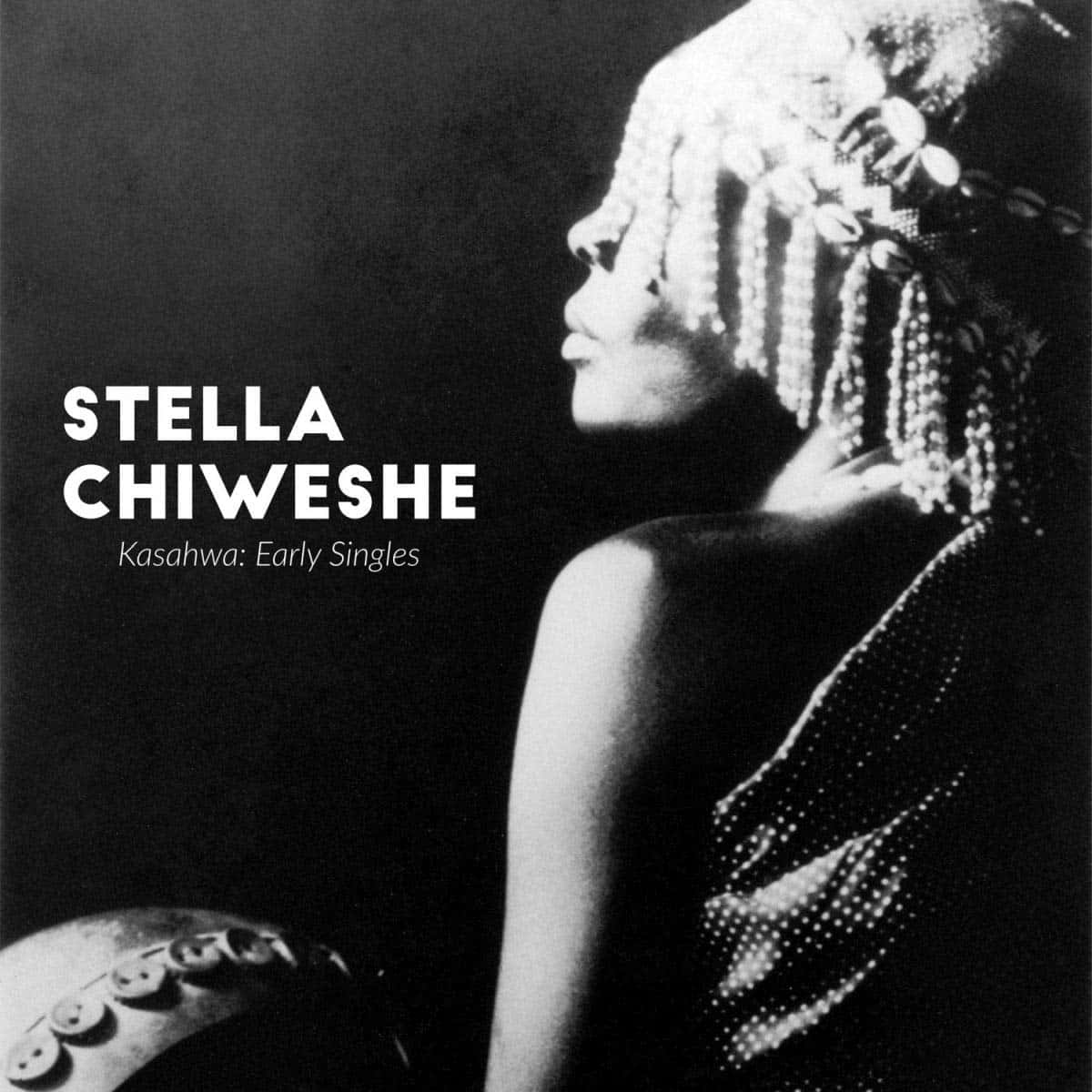
3. Stella Chiweshe
Kasahwa: Early Singles
Glitterbeat Records
“I am a rebel,” admits 70-year-old Stella Chiweshe, smiling. Her album, Kasahwa: Early Singles offers a fascinating introduction to the world of Mbira, the term not only referring to the instrument – consisting of 22 to 28 metal keys mounted on a wooden body – but also to a musical genre, and on a much wider level, to an entire culture and deeply spiritual lifestyle, very much at the core of the young Zimbabwean nation. Mbira is an ancient mystical music which has been played for over a thousand years by the Shona people, a group which forms the vast majority of the country’s population. Mbira pervades all aspects of Shona culture, both sacred and secular. Its most important function is as a “telephone to the spirits of people, water, trees, stones and birds,” used to contact both deceased ancestors and tribal guardians, at all-night ceremonies. Kasahwa is a collection of impossible-to-find early 7”s, eight cuts spanning the period from 1974 to 1983 and representing Mbira in its purest form. None of these songs had been released outside of Africa so far.
Listen: Bandcamp / Spotify / Apple Music / Deezer
2. Dur Dur of Somalia
Vol.1, Vol.2 (Analog Africa N°27)
Analog Africa
The secrets to Dur-Dur’s rapid success is inextricably linked to the vision of Isse Dahir, the founder and keyboard player of the band. Isse’s plan was to locate some of the most forward-thinking musicians of Mogadishu’s buzzing scene and lure them into Dur-Dur. Ujeeri, the band’s mercurial bass player was recruited from Somali Jazz and extraordinary drummer Handal had previously played in Bakaka Band. These two formed the backbone of Dur-Dur and would become one of Somalia’s most extraordinary rhythm sections.
On their first two albums, Volume 1 and Volume 2, three different singers traded lead-vocal duties back and forth. Shimaali, formerly of Bakaka Band, handled the Daantho songs, a Somalian rhythm from the northern part of the country that bears a striking resemblance to reggae; Sahra Dawo, a young female singer, was recruited from Somalia’s national orchestra, the Waaberi Band. Their third singer, the legendary Baastow, whose nickname came from the Italian word “pasta” due to the spaghetti-like shape of his body, had also been a vocalist with the Waaberi Band, and had been brought into Dur-Dur due to his deep knowledge of traditional Somali music – and particularly saar, a type of music intended to summon the spirits during religious rituals. These traditional elements of Dur-Dur’s repertoire sometimes put them at odds with the manager of the Jubba Hotel who once told Baastow: “I am not going to risk having Italian tourists possessed by Somali spirits. Stick to disco and reggae.”
Listen: Bandcamp / Spotify / Apple Music / Deezer
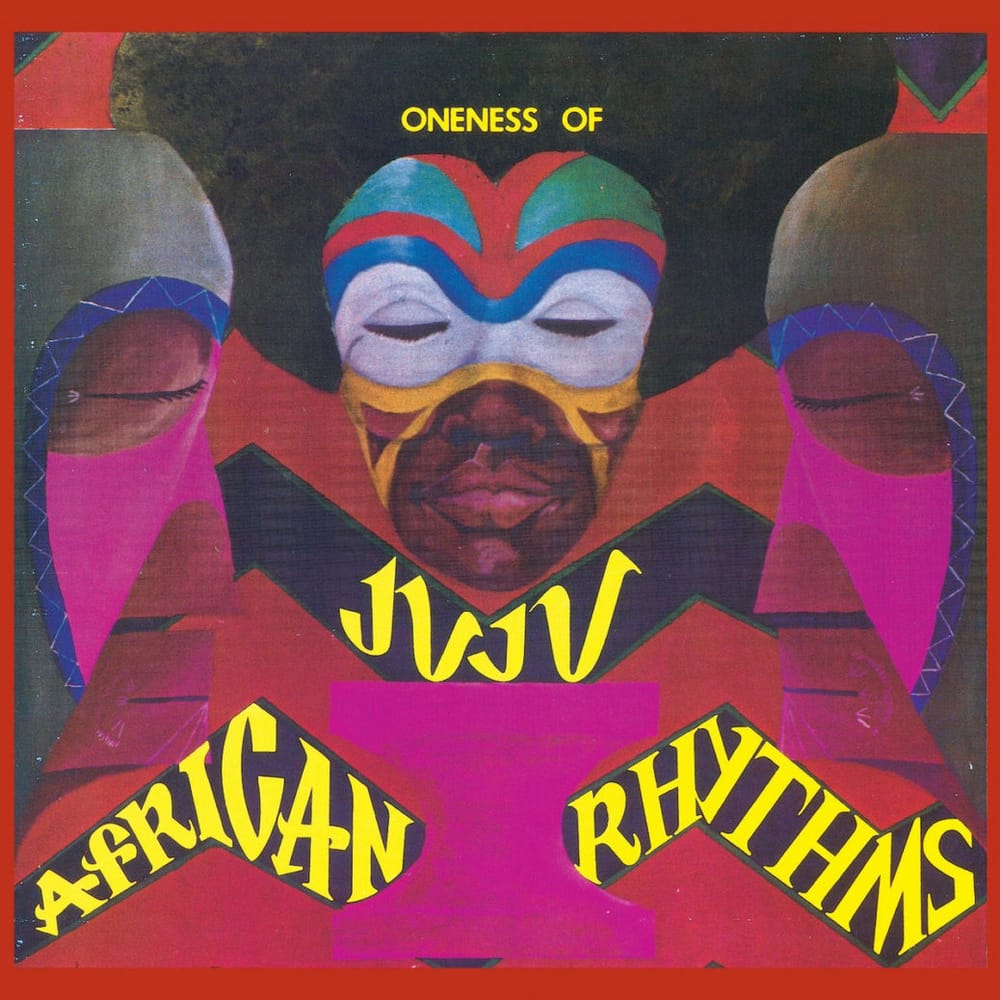
1. Oneness of Juju
African Rhythms
Strut
Based around saxophonist James Plunky Branch, Oneness of Juju was the second incarnation of the Afrocentric creative jazz group Juju that recorded two albums for the Strata East label in the early ’70s. Along with new members and new instruments, including the introduction of a drum kit to the African and Afro-Cuban percussion section, a new name was adopted to reflect the direction of the group. While Juju was often compared to Pharoah Sanders and was being active in the loft jazz scene in New York, Oneness of Juju incorporated more mainstream R&B elements and introduced vocals to the new group sound as well. The sound of this incarnation, more akin to the Ohio Players and Kool & The Gang at this point, was documented on two recordings: 1975’s African Rhythms and Space Jungle Luv in 1976. An ever-evolving project, smooth jazz and hip-hop were incorporated in the ’80s and the group continued as Plunky & Oneness.
Listen: Bandcamp / Spotify / Apple Music / Deezer

